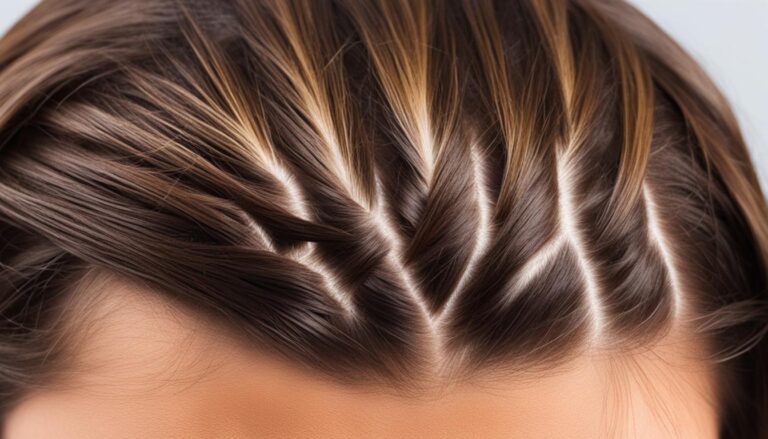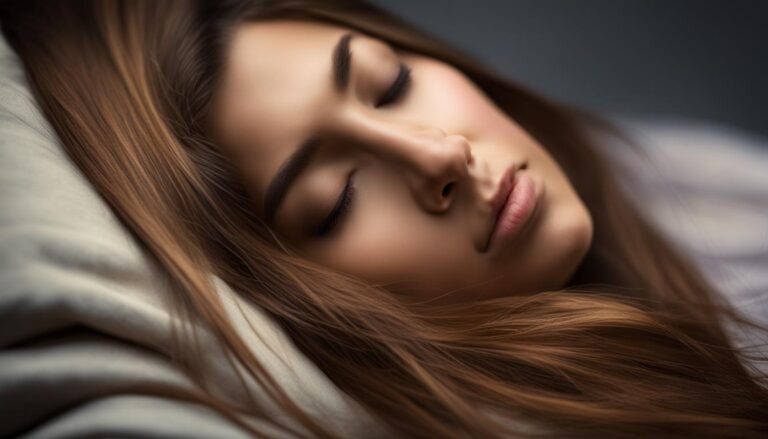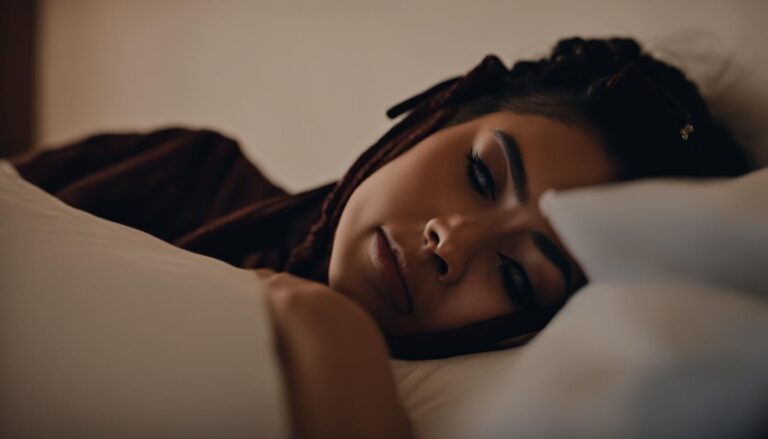Does staying up late cause hair loss?
As a professional copywriting journalist, I’ve delved into the topic of staying up late and its potential impact on our hair health. Many of us lead busy lives, juggling work, family, and personal commitments, often sacrificing sleep in the process. But does this sleep deprivation actually cause hair loss?
Research suggests that lack of sleep can be a contributing factor to hair fall problems. When we don’t get enough quality sleep, our bodies experience increased stress levels. This stress can trigger hair loss and affect the overall health of our hair.
Deep sleep plays a vital role in washing away a toxic protein called Beta Amyloid. However, when we are sleep deprived, this protein can build up, leading to elevated stress levels. In today’s stress-driven era, it’s crucial to prioritize good quality sleep for the sake of our hair health.
Key Takeaways:
- Staying up late and lack of sleep can contribute to hair loss.
- Sleep deprivation can increase stress levels, leading to hair fall problems.
- Deep sleep helps wash away a toxic protein, Beta Amyloid, which is essential for hair health.
- Prioritizing good quality sleep is crucial in maintaining healthy hair growth.
- Managing stress and establishing a sleep routine can improve sleep hygiene and prevent hair fall.
Understanding the connection between staying up late, sleep deprivation, and hair loss is essential for taking proactive steps towards maintaining our hair health. In the following sections, we will explore in more detail the impact of lack of sleep on hair loss, tips for improving sleep hygiene, and the overall connection between sleep deprivation and hair health.
How does lack of sleep affect hair loss?
Lack of proper sleep can have a significant impact on hair loss. It’s well-known that stress is one of the top causes of hair fall, and lack of sleep can contribute to increased stress levels. When we experience deep sleep, our brain activates a sewage system that helps wash away a toxic protein called Beta Amyloid. However, without enough sleep, this protein can build up, resulting in higher stress levels and a greater risk of hair fall. Therefore, it’s crucial to understand that lack of sleep not only affects hair health but also impacts brain functioning.
The connection between sleep and hair loss goes beyond surface-level stress. Sleep deprivation can disrupt the natural growth cycle of hair follicles, leading to premature hair loss. Furthermore, lack of sleep can also affect the body’s hormonal balance. Increased levels of cortisol, known as the stress hormone, have been associated with hair loss. When our sleep is compromised, it can lead to an imbalance in cortisol levels, further contributing to hair fall.
It’s important to recognize that taking care of our sleep is not only about ensuring a good night’s rest but also about maintaining overall well-being. Prioritizing sleep is crucial for managing stress levels and allowing the body to function optimally. By implementing healthy sleep habits and improving sleep hygiene, we can help prevent hair loss and promote healthy hair growth.
Tips for improving sleep hygiene and preventing hair fall
In order to improve sleep hygiene and prevent hair fall, it is important to establish a proper sleep routine. Going to bed and waking up at the same time every day can train the body to know when it’s time to sleep, promoting better sleep quality. Consistency is key when it comes to sleep routines, so try to stick to this schedule even on weekends.
Creating a conducive sleep environment can also make a big difference. Dimming the lights in the bedroom signals to the body that it’s time to wind down and prepare for sleep. Keeping the temperature slightly cooler can also enhance comfort and promote better sleep. Aim for a temperature around 65 to 68 degrees Fahrenheit (18 to 20 degrees Celsius) for optimal sleep conditions.
Engaging in a relaxing activity before bed can help calm the mind and promote better sleep. Reading a book, preferably something light and entertaining, can help shift the focus away from daily stressors and induce a sense of relaxation. However, it’s important to choose a physical book over digital devices, as the blue light emitted by screens can disrupt the body’s natural sleep-wake cycle.
In addition to establishing a sleep routine and creating a conducive sleep environment, it’s important to be mindful of certain habits that can negatively impact sleep and contribute to hair fall. Limiting daytime naps to less than 30 minutes can prevent excessive drowsiness and disruptions to nighttime sleep. Avoiding digital stimulation, such as using phones or computers, before bed can also help calm the mind and prepare the body for sleep. Additionally, it’s best to limit caffeine intake, ideally avoiding it entirely, or at least 4-6 hours before bedtime, as caffeine can interfere with sleep quality.
The connection between sleep deprivation and hair loss
Sleep deprivation can have a significant impact on the health of your hair. The growth cycle of hair follicles can be disrupted when you don’t get enough sleep, leading to premature hair loss. The relationship between sleep deprivation and hair loss is complex, but research suggests that it is primarily related to the effects of stress on the body.
When you don’t get enough sleep, your body experiences increased levels of stress. This stress can disrupt the balance of hormones in your body, including cortisol, the stress hormone. High levels of cortisol have been associated with hair loss, as it can interfere with the normal growth of hair follicles. Additionally, sleep deprivation can also lead to inflammation in the body, which further contributes to hair loss.
It’s important to understand that sleep deprivation doesn’t directly cause hair loss, but rather it can exacerbate existing hair loss conditions. If you already have a genetic predisposition to hair loss or are experiencing other factors that contribute to hair fall, such as poor nutrition or hormonal imbalances, lack of sleep can worsen these conditions.
Sleep deprivation and the hair growth cycle
To understand the connection between sleep deprivation and hair loss, it’s essential to know how the hair growth cycle works. The hair growth cycle consists of three phases: the anagen phase (active hair growth), the catagen phase (transitional phase), and the telogen phase (resting phase). During the telogen phase, hair follicles rest before shedding and being replaced by new hair.
Sleep deprivation can disrupt this natural cycle, causing more hair follicles to enter the telogen phase prematurely. As a result, you may experience excessive shedding and thinner hair. Additionally, lack of sleep can affect the quality of hair follicles, making them weaker and more prone to breakage.
Reducing sleep deprivation and promoting hair health
To minimize the effects of sleep deprivation on hair loss, it’s crucial to prioritize good sleep hygiene. Here are some tips to improve your sleep routine and promote hair health:
- Stick to a consistent sleep schedule, going to bed and waking up at the same time every day.
- Create a relaxing bedtime routine, such as reading a book or taking a warm bath, to signal to your body that it’s time to sleep.
- Create a sleep-friendly environment in your bedroom by keeping the lights dim and maintaining a cool temperature.
- Avoid daytime napping, especially for more than 30 minutes, as it can interfere with your nighttime sleep.
- Avoid digital stimulation before bed, such as using electronic devices, as the blue light emitted can disrupt your sleep patterns.
- Limit your intake of caffeine, especially in the afternoon and evening, as it can interfere with your ability to fall asleep.
By implementing these sleep hygiene practices, you can improve the quality and duration of your sleep, reducing the risk of sleep deprivation-related hair loss. Remember, getting enough restorative sleep is essential for overall well-being, including maintaining healthy hair.
Conclusion
In conclusion, staying up late can indeed cause hair loss. The importance of sleep for hair health cannot be emphasized enough. By depriving ourselves of proper sleep, we subject our bodies to increased stress levels, which can have a detrimental effect on our hair.
When we stay up late, we disrupt our sleep routine, preventing our bodies from entering deep sleep, where the brain can wash away toxic proteins like Beta Amyloid. This build-up of toxic proteins can lead to heightened stress levels and, ultimately, hair fall.
It is crucial to prioritize sleep and practice good sleep hygiene to maintain healthy hair. Establishing a consistent sleep routine, creating a sleep-friendly environment with dim lights and a cool temperature, and avoiding digital stimulation before bed can all contribute to better sleep quality and, consequently, healthier hair.
Remember, the connection between staying up late and hair loss is real, but it’s never too late to prioritize sleep and take steps towards better hair health. Make sleep a priority, and you’ll be rewarded with not only a good night’s rest but also strong, luscious locks.
FAQ
Does staying up late cause hair loss?
Yes, staying up late can contribute to hair loss. Lack of proper sleep can lead to increased stress levels, which is a known cause of hair fall.
How does lack of sleep affect hair loss?
Lack of sleep can cause stress, which disrupts the body’s hormonal balance and can lead to hair loss. Additionally, deep sleep helps in washing away a toxic protein called Beta Amyloid, and lack of sleep can cause a build-up of this protein, further increasing stress levels.
What are tips for improving sleep hygiene and preventing hair fall?
To improve sleep hygiene and prevent hair fall, establish a consistent sleep routine by going to bed and waking up at the same time every day. Dim the lights in your bedroom and keep the temperature slightly cooler to signal your body that it’s time to sleep. Reading a relaxing book before bed can help relax the mind. Limit daytime naps to less than 30 minutes and avoid digital stimulation before bed, such as using phones or computers. It’s also recommended to avoid or limit caffeine consumption, ideally entirely or at least 4-6 hours before bedtime.
What is the connection between sleep deprivation and hair loss?
Sleep deprivation can impact the natural growth cycle of hair follicles, leading to premature hair loss. Lack of sleep can cause stress and disrupt the normal functioning of the body, including the growth of hair follicles. Increased levels of cortisol, the stress hormone, have been associated with hair loss.
Why is sleep important for hair health?
Sleep is important for hair health because it helps regulate stress levels and supports the proper functioning of the body, including the growth cycle of hair follicles. Prioritizing good quality sleep can help prevent hair loss and promote healthy hair growth.







